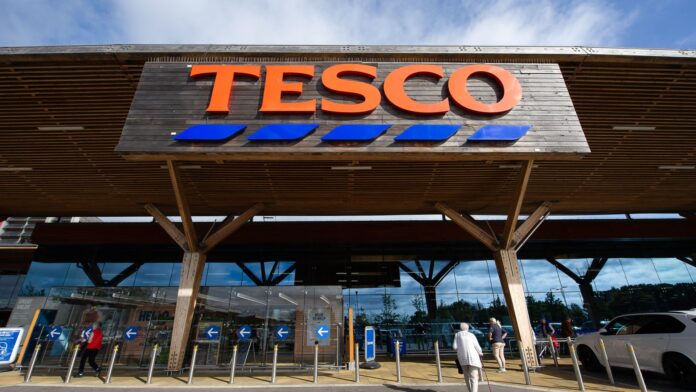[ad_1]
TESCO profits soared by 160 per cent to the highest level in over a decade.
Britain’s biggest retailer said the increase was boosted by a return to sales growth and not just by price hikes.
It said the recent intense rate of inflation had “lessened substantially”, as annual profits hit £2.3billion compared to £882million the year before.
Sales have risen 4.4 per cent to £68.17billion.
Ken Murphy, chief executive, said falling food inflation would mean its recent 6.8 per cent like-for-like growth would be lower this year.
Unions were quick to accuse the grocer of profiteering.
Unite said Tesco was “raking in mountains of cash while families struggle to put food on the table because of sky-high prices”.
And it said: “Many companies have used the cost of living crisis to grab excessive profits.”
Mr Murphy hit back at the “greedflation” suggestions and said the supermarket was more competitive than it had ever been against the discounters and rivals.
He highlighted Tesco had reduced prices by 12 per cent on 4,000 lines as well as its Clubcard prices and invested in its Aldi Price Match.
He said: “We have never been cheaper than Asda, but we have been for 19 months in a row.”
Tesco is returning £1.5billion to investors, £1billion via a share buyback, after the profits and selling its bank to Barclays earlier this year.
Around 20,000 staff will also share a £70million thank you bonus, with full-time shop staff receiving around £300.
Mr Murphy said he was taking a “balanced approach to running the business” and said its improving market share proved it was giving “shoppers more reason to shop at Tesco”.
He said while inflation was falling, it was “sticky” on cocoa, coffee and potatoes.
The recent rocketing of olive oil prices, with a 500ml bottle of Filippo Berio hitting £8.55, would start to ease, he said.
But the rise was due to “climate issues” creating a poor harvest in the Mediterranean.
Tesco Clubcard, which offers cheaper prices, is now used in 70 per cent of all the retailer’s transactions and 82 per cent in its bigger stores.
Mr Murphy said while “things are difficult for many customers”, the chain is stealing shoppers from its upmarket rivals with its premium Finest range.
Now cut prices
TESCO’S eye-watering profits are proof that the UK’s biggest retailer has been flexing its muscles.
On the one hand it’s easy to say the supermarket has never had it so good.
Firstly, food inflation has enabled it to charge more for groceries than ever before.
Secondly, two of its biggest rivals — Morrisons and Asda — have been weakened by debt-fuelled buyouts.
But Britain’s food retail market is the most competitive in the world.
Aldi and Lidl have twice as many stores as they used to, and even posh shoppers have now switched to their bargain groceries.
Tesco boss Ken Murphy said yesterday: “We don’t expect the intensity of competition to ease at all.”
We’re a long way off from food prices falling — deflation — but Tesco will be under as much pressure as its rivals to pass on falling costs to customers.
The retailer has to walk a tightrope between pleasing shoppers and appeasing shareholders, who were burnt during its accounting scandal a decade ago.
However, these bumper profits mean Tesco has a lot more firepower than its rivals, so if it pulls the trigger on a price war it can afford to use the bazookas.
Let’s hope it does soon.
Cracks in China
CHINA’S economy has been put on negative watch by credit rating agency Fitch, amid growing concerns over its property crisis and rising government debts.
The outlook downgrade for the world’s second biggest economy comes as Beijing is still struggling to recover after the pandemic.
Fitch has kept its rating on Chinese sovereign bonds at A+.
The agency said the negative outlook reflected “uncertain economic prospects amid a transition away from property-reliant growth”.
HOLIDAY scam victims lost an average of £765 in the past year, according to Lloyds.
A growing number of fraudsters are using Airbnb, Booking.com and Facebook it warns.
And the most common cons involve plane tickets and caravans.
Air’s high flier
THE former boss of Rolls-Royce has been parachuted into Britain’s glitch-prone air traffic control provider.
Warren East will join National Air Traffic Services (Nats) as chairman in August.
Nats suffered an IT meltdown during last year’s August bank holiday, which resulted in thousands of cancelled flights and holidays ruined for 700,000 passengers.
Nats chief executive Martin Rolfe is still clinging on to his role, despite calls to quit. He said he was looking forward to working with Mr East.
THG hs reduced losses
THG, the online retailer behind Myprotein, Cult Beauty and City AM newspaper, has narrowed losses after cutting costs and boosting automation.
Its annual losses have fallen to £252million, compared to a £549.7million loss in 2022 after it sold some underperforming businesses.
Sales fell 8.4 per cent to £2billion, but improved by 1.1 per cent in the last quarter.
CEO Matthew Moulding said that the performance would have triggered a £1million bonus to senior staff, but he had waived that as well as his salary this year.
However, the accounts reveal he bagged £14million in rent last year alone from the company after THG transferred its properties to his ownership prior to the company’s listing.
He took to Linkedin to criticise “the UK’s dire public market” and said he was “super proud” of the company’s performance after a brutal couple of years.
Shares in THG fell by 10 per cent yesterday to 61p.
Odds off rate cut
FINANCIAL markets have lowered their bets the Bank of England will start cutting interest rates in June — after US central bank cuts hopes were dashed.
Figures out yesterday showed US inflation is still rising, to 3.5 per cent in March.
This prompted traders to believe rate cuts may not be until November, rather than July.
There is now a 50 per cent chance of a UK base rate cut in June, compared to 60 per cent before the US inflation figures.
[ad_2]









